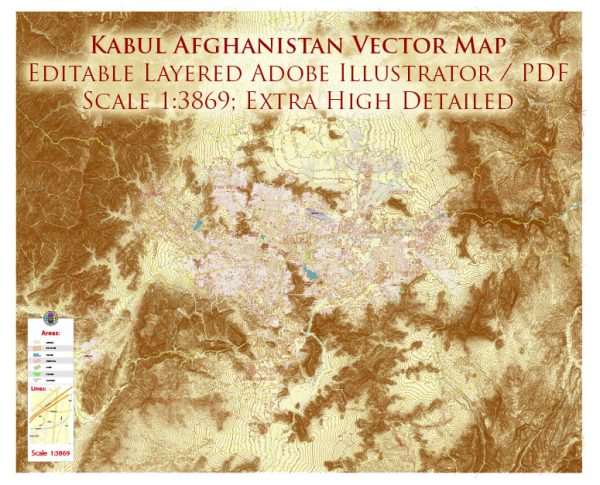Kabul, the capital of Afghanistan, is a key economic and transportation hub in the country.
Vectormap.Net provide you with the most accurate and up-to-date vector maps in Adobe Illustrator, PDF and other formats, designed for editing and printing. Please read the vector map descriptions carefully.
Here is a detailed description of its economic and transport connections:
Economic Overview:
- Trade and Commerce: Kabul serves as a major center for trade and commerce in Afghanistan. The city hosts a variety of markets, bazaars, and commercial districts where goods and services are bought and sold.
- Informal Economy: In addition to formal businesses, Kabul has a significant informal economy, with many small businesses and street vendors contributing to the economic activity. This informal sector is an important source of income for a large portion of the population.
- Agriculture and Industry: The economy of Kabul is diversified, with activities ranging from agriculture to light industry. The city and its surroundings produce agricultural products such as fruits, vegetables, and grains. Additionally, there are small-scale manufacturing and craft industries.
- Government Presence: Kabul is the political and administrative center of Afghanistan, hosting various government offices, ministries, and diplomatic missions. The government presence significantly impacts the city’s economic dynamics.
Transportation Connections:
- Kabul International Airport (Hamid Karzai International Airport): The main gateway for air travel, Hamid Karzai International Airport connects Kabul to international destinations. It serves as a crucial hub for both passenger and cargo flights.
- Road Network: Kabul is connected to various parts of Afghanistan through an extensive road network. However, the quality of roads may vary, and some areas may face challenges due to security concerns.
- Public Transportation: The city has a mix of public transportation options, including buses and shared taxis. However, the public transportation infrastructure may not be as developed as in some other major cities.
- Challenges: The ongoing geopolitical situation in Afghanistan, including security concerns and political instability, can impact transportation and economic activities. Additionally, the country has faced challenges related to the maintenance and development of transportation infrastructure.
Please be aware that the information provided here is based on the situation as of January 2022, and there may have been changes since then. Given the evolving nature of the political and economic landscape, it is advisable to check for the latest updates from reliable sources for the most current information on Kabul’s economic and transport connections.


 Author: Kirill Shrayber, Ph.D. FRGS
Author: Kirill Shrayber, Ph.D. FRGS